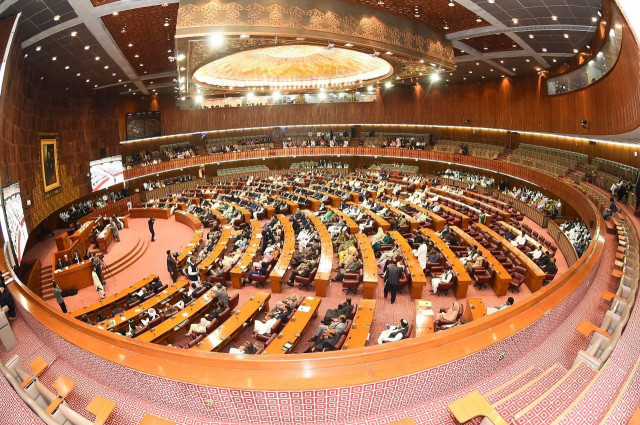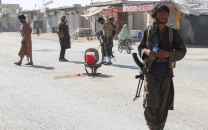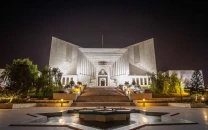Controversy engulfs convening of NA session
President reluctant to greenlight inaugural session over reserved seats as PML-N and PPP decry hold-up

A brewing storm of controversy swirled over the impending National Assembly session on Sunday after Dr Arif Alvi appeared reluctant to greenlight its inaugural proceedings, ostensibly over reserved seats allocation – drawing sharp criticism from the coalition of PML-N and PPP.
The tug-of-war intensified as the PML-N contended that, following the expiration of the February 29 deadline, the speaker could autonomously convene the session. However, a former official from the Election Commission of Pakistan (ECP) dismissed this assertion.
The PTI-leader-turned-president was sent a summary by the caretaker parliamentary affairs ministry, urging the initiation of the NA session on Monday.
Despite the plea, President Alvi utilized his constitutional authority to defer the session by 15 days, citing apprehensions about the completion of the reserved seats allocation process.
Nevertheless, the president received information that, in accordance with the Constitution, the NA session must be summoned on February 29. In addition, he was apprised that the constitution dictates the necessity of convening the NA session within 21 days of the elections.
Subsequently, on March 1, the papers for the NA speaker will be presented to the assembly secretariat. Following this, on March 2, the election for the new speaker and their deputy will take place.
Similarly, the process of submitting the nomination papers for the election of the prime minister will take place on March 3. The election for the post of the premier will be held in the NA on March 4. The election of the new president will be conducted by the ECP on March 9.
It was also mandatory to convene the session of the Khyber-Pakhtunkhwa Assembly by February 29.
The ECP has allocated reserved seats to political parties but not granted any to the Sunni Ittehad Council (SIC) after the PTI-backed independent candidates merged with it for this very purpose.
On February 21, the SIC approached the ECP, seeking the allocation of reserved seats in the NA and provincial legislatures after the PTI sealed its alliance with the council.
However, the ECP has yet to decide whether to entertain the request or not.
The SIC had neither applied for any reserved seat to the ECP – a requirement under the law – nor had it filed a priority list of candidates before the elections.
Speaker’s authority
Speaking to the media outside the Punjab Assembly in Lahore, PML-N stalwart Senator Ishaq Dar on Sunday said if the president did not convene the inaugural session despite the submission of a summary to him for this purpose, its speaker could constitutionally do so by himself on February 29.
The PML-N leader said it was clearly mentioned in the Constitution that if the new NA session was not called, the speaker had the authority to convene it on the 21st day.
He added that according to the constitutional 21-day deadline, February 29 was the last date.
Dar elaborated that even in the provinces if the governor did not convene the session of the provincial legislature, the same principle would apply there.
Addressing a news conference at the PML-N’s secretariat in Lahore’s Model Town, party leader Attaullah Tarar claimed that the issue of the NA session was being deliberately made controversial and there was no justification to ruin the matter after the notification of the reserved seats.
Tarar further maintained that the PTI had always tried to derail democracy in Pakistan and its founding chairman Imran Khan writing a letter to the International Monetary Fund (IMF), urging the global lender to give the poll results a thorough once-over before cutting any new cheques for Islamabad, was a proof of the party’s involvement in conspiracies against the country.
In a related development, PPP leader Shazia Marri said the president was “misusing his authority” by delaying the summoning of the new NA session.
“It is necessary for the president to call a session of the National Assembly without delay on the summary of the [interim] prime minister,” Marri said in a statement, adding that Dr Alvi should follow the Constitution rather than the “orders of one individual”.
The PPP leader further said Dr Alvi was the same president who had tried to “unconstitutionally” dissolve the NA in the past as well. She continued that Dr Alvi’s “violation of the Constitution” and “misuse of office” would remain a part of history.
“The National Assembly elections have been completed. The president is bound to convene [its] session.”
However, Kanwar Dilshad, a former secretary of the ECP, refuted the claim of Dar that the NA speaker had the power to convene the session by himself.
He said if the president was refraining from calling the NA session, one-third of its members could write to the speaker for its requisition.
“But the question which then arises is that since they [elected representatives] have not taken the oath yet, then the speaker cannot requisition the session. So it seems that the speaker does not have the power, the president does,” he maintained.
However, the ex-ECP official conceded that the Constitution clearly stated that it was mandatory for the sessions of the NA and provincial legislatures to be called 21 days after the general elections were held.
He continued that the president should summon the sessions within 21 days – that was on February 29.
In a parallel development, PPP Parliamentary Leader Ali Haider Gillani raises eyebrows over President Alvi's alleged misuse of the office for personal vendettas and opposition agendas.
In a statement issued here on Sunday, he emphasised the importance of upholding democratic principles and stated that the presidency is once again being used for undemocratic actions.
He highlighted the constitutional obligation, as per Article 91, that the president is bound to convene a session of the National
Assembly within the prescribed time frame on the advice of the premier.
Gillani expressed dismay over the continuation of President Alvi's tenure beyond its expiry, suggesting a bias towards alternate agendas. He urged for the preservation of the presidency's sanctity, condemning any indication of bias in Arif Alvi's recent statements.



















COMMENTS
Comments are moderated and generally will be posted if they are on-topic and not abusive.
For more information, please see our Comments FAQ